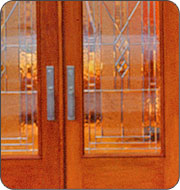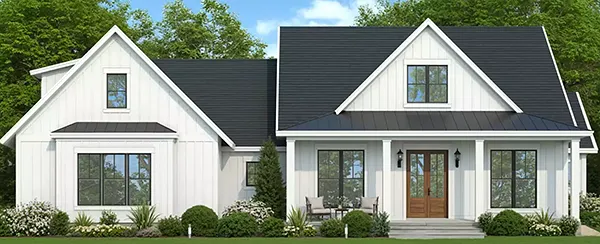Entry Hardware
 Your front door is the focal point of your home. For this reason, you should choose the entry hardware wisely. Not only does this give the first impression of your home, but also secures your home against intruders. When you choose the entry hardware, remember that that locks are not always included. Below is good information to guide you in the selection of your entry door hardware.
Your front door is the focal point of your home. For this reason, you should choose the entry hardware wisely. Not only does this give the first impression of your home, but also secures your home against intruders. When you choose the entry hardware, remember that that locks are not always included. Below is good information to guide you in the selection of your entry door hardware.
Types of Locks
Most of the time, residential locksets fall into two categories: mortise or tubular/cylindrical. The differences in these are the way each set is constructed and installed. The quality of the lockset will not make a difference if it is not installed properly. Add deadbolts to all of your exterior doors to add extra security. Make sure the deadbolts have a minimum of one-inch 'throw'.
Cylindrical/Tubular Lockset
A cylindrical lockset fits into a large hole bored into the door's face and is operated by a key inserted into the exterior knob also called a key-in-knob lockset. This system works by using a latch bolt with a beveled end. This end is spring-loaded and retracts when the knob is turned or there is end pressure. Anything less than an inch should not be considered secure and most bolts only extend half-inch. For this reason, try to find a cylindrical lockset that comes with a dead latch or deadlocking latch bolt that engages when the door is closed and will not retract using a thin material such as credit cards into the jam. Even though this is the most popular, least expensive, and easiest to install, it is also the least secure.
Mortise Lockset
Mortise locksets fit into a rectangular pocket that is cut into the door's edge. They normally come with a deadbolt, which is part of the locking mechanism. When you turn the key from the outside it releases both the knob and the deadbolt. This is the securest lockset available. It comes in three styles that are pleasing for the décor: knob, lever, and handle. There are many different design options in each of these styles, all with easy use.
Deadbolt Locks
You should consider a deadbolt lock as a primary fundamental part of your exterior door's security hardware. The blunt-ended bolt can't be retracted by end pressure and will have at least one-inch of throw. A good deadbolt has a low locked-side profile that protects the lock subassembly or cylinder from forced entry. These can be purchased in single or double-cylinder configurations. These may be restricted by local building codes. Single-cylinder is most popular and uses a key on the outside and a knob or thumb turn on the inside.
What Makes a Good Quality Lock?
Check the Grade
The American National Standards Institute (ANSI) in regards to certified security locks has established three standard grades. Grade 1 is the most secure. Grade 2 is mid level. Grade 3 is the least secure, but is suitable for residential applications. Grade 3 is also the most likely to be found in your hardware stores. To order the higher-grade locks used in commercial applications you can contact a door hardware manufacturer or ask your contractor.
Forged is the Best
A lock with components that are forged are much better than cast. When the parts are forged, a brass rod (or 'billet') is heated, compressed, and then shaped in a die under tremendous pressure. This results in a smooth dense component rather than rough die-cast making it twice as strong. Low-quality, stamped, plated-steel components can't even compare to forged or cast and aren't recommended for use on exterior doors because they can easily be opened by using a screwdriver or credit card. You can also add a quality, durable finish that won't tarnish or fade on forged components because they have a smooth surface.
Look Inside the Lock
Chrome and brass plating will not last a long time. Make sure you look inside the lock. If you find those materials, pass on the purchase. You should find hardened and corrosion-resistant components such as phosphorous bronze springs and stainless steel throw bolts.
Finishes
Your greatest concern should be the finish. Not only does it give the garnished appearance of the door, but it also should remain in good condition for some time. Brass is still the top finish, but stainless steel, bronze, chrome, antique pewter and satin nickel are just as stunning. Choose your finish not only to suit your taste but also to weather the outdoor elements and usage. Acid rain, humidity, salt air, lawn chemicals, and heavy usage can erode some finishes. Polished brass would be the least able to withstand these things. Stainless steel in satin or bright finishes would be better recommended. Oil rubbed bronze finish would also work and would develop a distinctive, wear-burnished patina over time. Finish warranties range from ten years to life. You will have to read the packaging carefully to find a product that has a lifetime and anti-tarnish warranty.
Designer note: To add to the appearance of your door, choose a product manufactured by a manufacturer that also offers accessories to match your lock. Things like entry lamps, door knockers, house address numbers, kick plates, mail slot trims, and more can blend together to create impressive looks.
Cost
Door locking hardware prices range $15 to $1500, but you should allow at least $60 per exterior door for a Grade 2 keyed-entry knob and deadbolt and $250 for a mortise lockset.



.png)
.png)
 Your front door is the focal point of your home. For this reason, you should choose the entry hardware wisely. Not only does this give the first impression of your home, but also secures your home against intruders. When you choose the entry hardware, remember that that locks are not always included. Below is good information to guide you in the selection of your entry door hardware.
Your front door is the focal point of your home. For this reason, you should choose the entry hardware wisely. Not only does this give the first impression of your home, but also secures your home against intruders. When you choose the entry hardware, remember that that locks are not always included. Below is good information to guide you in the selection of your entry door hardware. 
